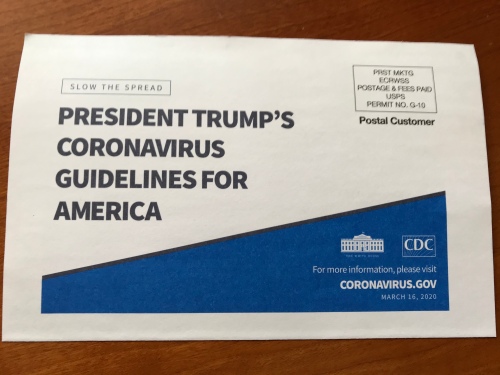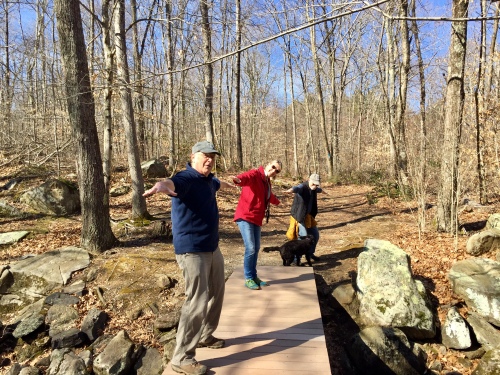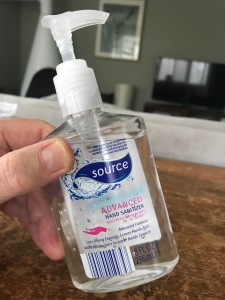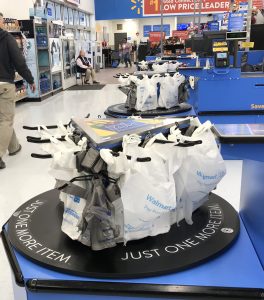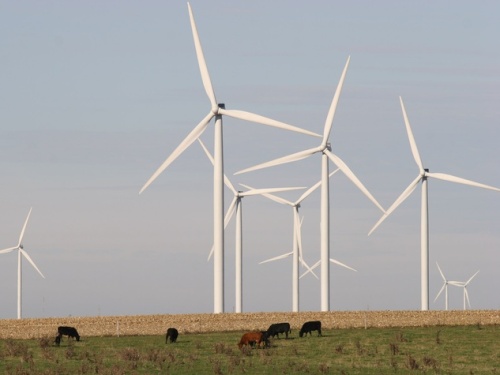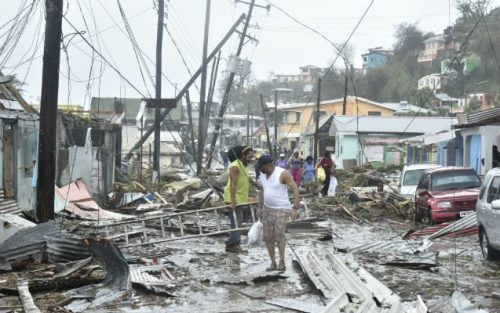This is how the day begins: Mary and I get up to brush our teeth and dress, and Lucy remains sprawled at the foot of the bed, watching us, lounging. I might walk over and give her ears a scratch. Then she stands up on the bed, does a quick downward dog and hops down to the floor. I stretch, she stretches again — down in front, down in back. She may lie down on the floor and I’ll rub my foot along her spine, in response to which she will stretch her legs out, curve her back a bit and groan with pleasure.
She retrieves her dark blue stuffed octopus, plops it at Mary’s feet and sits, ready to play. We toss it around the bedroom for a bit and she leaps after it, always bringing it back to us. Eventually I kick the octopus out the bedroom door onto the third floor landing; she runs out and grabs it, gnaws on it some then lets it go, because she knows what’s next. I boot it down one flight of stairs, and Lucy hurls herself down the steps to retrieve it. She waits at the next landing for me to come down and boot the thing to the second floor, and off she tumbles again. Eventually she winds up down on the first floor and waits.
When I trod downstairs and grab her harness, she bolts to the other side of the couch and our next game begins. “Iiiiiii’m gonna getcha!” I say, and I start chasing her around the couch, now this way, now that. If I crouch down, hands spread in front of me, she’ll play growl and keep running from me. Eventually she will bolt across the room and into Mary’s office — ollie ollie enfree! — then turn and slowly walk back out so I can put on her harness. “You win, Lucy! You win!”
I strap on her harness, put on my shoes and a jacket, grab a couple poop bags and a training clicker (just in case, though I no longer need it with her). I fasten her leash and we march out the door. As soon as I close the door I let the leash go, and Lucy bounds around the corner of the house and down the driveway. I jog after her and call out, “Wait,” but halfway down the driveway, she has already stopped, and is waiting for me. Unless a squirrel pops up, and then she is off on the chase.
I grab the leash and off we go down Saddle Hill Drive, Lucy running and pulling me into a jog at the end of the leash; I can’t go far, knees are a little dicey, but I give her a couple dozen steps and she slows down to a quick trot. It’s my morning exercise, getting my heart pumping and warming me up when it’s cold outside. We stroll a quarter mile over and down the hill almost to Rte. 80, where she sniffs around and finds her spot.
Or, she pulls me up onto a grassy area just down the street, below a wooded hillside, sniffing toward the woods and pulling at the lead; I get the signal. I unclick the leash and she’s off, running into the trees, roaming back and forth until she finds her spot. Then if I grab a stick, she’s all game to fetch it, and runs into the woods again and gnaw on it.
Or, Lucy balks just around the corner: She stops and stands, and no amount of tugging induces her to continue; she is done. The walk is every day, rain or shine, but the way it plays out is up to her. I reach down and give her ears a scratch and say, “OK, let’s go home,” and she leads me across the street and along the other side toward our driveway. At our lawn, I let her loose again, and she runs around investigating whatever it is dogs are looking for. I stop at the end of the driveway and reach down for the morning paper; Lucy’s already there, pouncing on it. “Hey hey,” I say, and she backs off and sits. I grab the paper and give it to her; she grabs it with her mouth, and as I call out “Paper!” she runs it up the driveway, around the corner to the back door. If I’m slow coming up the driveway, she runs back, paper still in her jaws, as if to make sure I’m still coming. Inside, she runs around the entry hall and I tell her, “Bring the paper to Mary!” And she bolts up the spiral stairway to the kitchen. She looks for Mary wherever she might be and drops the paper, knowing that Mary’s “Good paper!” means a treat’s in store.
I sit and sometimes with a grunt, untie my shoes. Lucy by now is back down and dropping the octopus at my feet, ready to play. I’m warmed from the walk, heart up to speed now, feeling good. I grab the toy from her and make a few tosses, and Lucy does Scooby-Do slip-slides across the tiles. If I stand and take a breath, just holding the octopus, she sits and waits for the throw. When I’m done, she takes her toy to the same corner by the bookshelf and lies down, the octopus between her front paws.
I walk up to the kitchen for coffee. As soon as I get Lucy’s food out and start rinsing her dishes, she’s up the stairs again, drops her toy beneath the dining room table, another hangout, and comes into the kitchen. I make her sit and stay. I put the food and water dishes down and say “Free,” and she’s on it. Mary and I hang out at the counter reading the paper and talking. When Lucy’s done with her meal she hops onto the small kitchen couch (the left side, always, by the orange pillow), cleans herself and curls up, head canted at an angle by the pillow, and settles in.
I put all this in the present tense because I don’t want to accept that it’s over. All that seemingly banal detail is just to point out that by contrast, my morning now is: get up, stretch, wash up, dress, walk down to the kitchen, put coffee on, head down the driveway to grab the newspaper. When I return, there is no one bothering me to play as I take my shoes off and plod back up to the kitchen. The degree to which a well-loved dog can insinuate herself into the minutes of your waking day — convince you to play and exercise and otherwise do her bidding — is remarkable.
There’s more to it: how intimately, and happily, Lucy was a part of my morning, and our lives, and how it shaped OUR day, our moods, our interactions. We almost took it for granted; not now of course.
We put Lucy to sleep late on a Friday afternoon, March 11. She was 6. She died from a viciously fast and resistant bacterial infection (pasteurella necrotizing fasciitis or something — a flesh eating bacteria that attacks the layer under the skin). The Friday before I took her out on a hike at Bittner Park, and she was her usual happy self, trotting down the path ahead of me, checking out the smells, dipping her paws into the stream there to lap up a quick drink of cold water.
By the next Friday she was so sick, suffering from this infection, that we had no choice but to have the vet put her down.
The details are really only important to Mary and me. They’re etched in our minds and evoke our grief. They mark the transition from happy-go-lucky us to the searing pain Lucy must have felt, and the palpable heartbreak we felt looking at her looking at us with her lovely brown eyes, wanting help, wanting to help, feeling such love both ways and yet unable to do anything about it.
We first took her to the hospital Saturday night, when she had trouble walking. Diagnosis: a pulled muscle. We gave her painkillers and rest. But late Monday night, when we still thought she might just have pulled a muscle, she began relentlessly licking her belly, which had a purple bruise on it. She was on the floor in the bedroom, next to the bed; at one point, she started to whimper, and even in my half-sleep I knew it was bad. By Tuesday morning she had licked her wound raw, and we took her right back to the hospital. That’s when we found out just how bad it was: They shaved her belly and leg and we could see all the bruising now, and the vet realized what was going on with the infection; though, we had our hopes up she could be treated with antibiotics and other therapies.
The look from this dog, oy: “I want to do what I’m supposed to do as your pup; but I’m also hurting and I need you to see it and what can we do?”
Through Thursday Mary and I were living in limbo: Talking to the vets, who kept saying what a great pup Lucy was, stoic and cooperative. We tried to stay upbeat. Friday morning a new vet called and said they wanted Lucy transferred to a different hospital so she could get treatment in a hyperbaric chamber. We drove down to pick her up for the move. She walked out to the car with us, and a vet tech helped us lift her into the back seat.
Not long after we got home from dropping her off in North Haven, the vet there called and said her heart had stopped. This put us into complete shock. Did we want to try to revive her? Yes of course was the answer — at least so we can reassess what’s going on. We spent the next 20 minutes sobbing. The vet called back: Lucy was back and breathing on her own; but we needed to consider what comes next. If she survived the next 24 hours, a huge IF, she might have a chance to beat the infection, but it would have destroyed a lot of her skin and meant a long process of healing, skin grafts, pain meds — all very dicey and painful. We took a walk down the street to process this. But the outcome seemed clear now.
So on Friday afternoon we drove back to the hospital in North Haven and they brought her out to a room so we could sit with her for a while. We took off her plastic head cone; she still had an IV tube in her paw, for the injections to come. Mary held her in her lap and tried to soothe her in ways I found uncanny. She talked about her going to see her Dad and their old dog Bronx, and I am starting to cry all over again just recalling this.
I paced the room and could not speak; I broke down every time I tried to utter a word. I barely got out a goodbye, Lucy, dear pup. We were both in tears. At the end of any day, Lucy would hop onto the bed, approach the head and sit and stare at us for a bit. Then Mary would give her a hug and she’d give Mary a lick in the face, then settle down by our feet for the night with a sigh. And now, as Mary held her, Lucy reached up and took a lick at Mary’s face, somehow in those last minutes finding a way to try to comfort Mary.
…
I have been here and there before with grief: Shocked, numbed, overcome with sadness, feeling the real physical ache in my heart. I find grief to be both about the specific loss at hand: Lucy, Ted, Joan, Connie, Delsie… but also an accumulation of loss, a kind of universe of grief that encompasses the fleeting nature of life, the inevitability of suffering, the broad sadness of the world — and at the same time the most intimate splinters of pain from a personal loss.
With Lucy there were none of the complications of a human relationship. It was pure friendship, joy, play, affection, and a willing obligation to care for each other in whatever ways we could. We’ll get another dog, for sure. Won’t be the same. So long, Lucy, and enjoy the next life.



